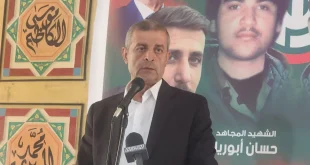“الاحتلال مستمر والمقاومة باقية: استحالة تحقيق استقرار في ظل الاحتلال الإسرائيلي”
مع كل انتخابات رئاسية أميركية، تتجدد الآمال والتساؤلات حول تأثير الإدارة الجديدة على مستقبل الصراع في الشرق الأوسط، خاصة في ظل استمرار الحرب بين إسرائيل والمقاومة في غزة ولبنان. لكن الوعود الانتخابية التي يطلقها المرشحون غالباً ما تواجه اختبار الواقع بعد توليهم المنصب، ليبقى السؤال: هل يمكن أن تشهد المنطقة تغييراً حقيقياً؟
المقاومة: عامل حاسم لتحقيق التغيير
في حديث خاص لـ”ليبانون ديبايت”، أوضح وليد الكيلاني، المسؤول الإعلامي في حركة حماس، أن المقاومة الفلسطينية لا تراهن على تغير الإدارات الأميركية، حيث يعتبر أن القيادة الأميركية تُدار من المؤسسات وليس من الأشخاص.
وأضاف:
“الرهان دائماً على صمود الشعب الفلسطيني ومقاومته، فهي العامل الأساسي الذي يُرغم الاحتلال الإسرائيلي على تقديم التنازلات.”
وشدد الكيلاني على أن الإدارة الأميركية، سواء الحالية أو القادمة، لديها القدرة على الضغط على إسرائيل لوقف عدوانها. فالولايات المتحدة، كممول رئيسي لإسرائيل، تمتلك القدرة على فرض شروطها. ومع ذلك، فإن الإدارات السابقة، بما فيها إدارة بايدن، اختارت دعم حكومة نتنياهو بشكل كامل على المستويات السياسية والعسكرية والإعلامية.
المقاومة والصراع المستمر
وأكد الكيلاني أن الشعب الفلسطيني يقاتل لاستعادة حقوقه المسلوبة منذ 76 عاماً. وأضاف:
“لن يكون هناك استقرار في المنطقة طالما لم يحصل الشعب الفلسطيني على حقوقه المشروعة. الاحتلال هو المصدر الأساسي للصراعات، والمقاومة ستبقى مستمرة طالما بقي الاحتلال.”
وأشار إلى أن القضية الفلسطينية ليست مقتصرة على قطاع غزة، بل تتعلق بتحرير كامل الأرض الفلسطينية. وأوضح أن أي محاولة لتثبيت وقف إطلاق النار لن تنجح دون منح الفلسطينيين حقوقهم المشروعة.
مستقبل الصراع في الشرق الأوسط
خلص الكيلاني إلى أن استمرار الاحتلال الإسرائيلي سيبقي المنطقة في دوامة من الحروب وعدم الاستقرار، وأن الحل الوحيد هو إنهاء الاحتلال وضمان حقوق الشعب الفلسطيني. فالمقاومة ليست خياراً، بل هي واقع حتمي طالما استمر الاحتلال.
المصدر: lebanon debate news
“Occupation Persists, and Resistance Endures: Stability Remains Elusive Amid Israeli Occupation”
With every U.S. presidential election, questions arise about the new administration’s potential impact on the Middle East conflict, especially during the ongoing war between Israel and the resistance in Gaza and Lebanon. Yet, campaign promises often collide with the realities of governance, leaving many to wonder if genuine change is possible.
Resistance: A Key Factor for Change
In an exclusive interview with “Lebanon Debate,” Walid Al-Kilani, media spokesperson for Hamas, stated that Palestinian resistance does not rely on changes in U.S. administrations, asserting that American leadership operates through institutions rather than individuals.
He added:
“The real bet lies in the resilience of the Palestinian people and their resistance, which remains the primary force compelling the Israeli occupation to make concessions.”
Al-Kilani emphasized that the U.S., as Israel's main benefactor, holds significant leverage to influence Israeli policies. However, previous administrations, including Biden’s, have chosen to align closely with Netanyahu’s government, providing unwavering support on political, military, and media fronts.
Ongoing Resistance and the Unresolved Conflict
Al-Kilani reiterated that the Palestinian people fight to reclaim their long-lost rights. He stated:
“There will be no stability in the region as long as the Palestinian people are denied their legitimate rights. The occupation is the root cause of conflict, and resistance will persist as long as it exists.”
He highlighted that the Palestinian cause extends beyond Gaza, aiming to liberate all Palestinian territories. Al-Kilani argued that attempts to enforce ceasefires will fail without granting Palestinians their rightful claims.
The Future of Middle Eastern Conflict
Al-Kilani concluded that as long as the Israeli occupation continues, the region will remain trapped in cycles of war and instability. The only viable solution is ending the occupation and ensuring Palestinian rights. Resistance, he stressed, is not a choice but a necessary response to the ongoing reality of occupation.
Translated by international scopes team
 International Scopes – سكوبات عالمية إجعل موقعنا خيارك ومصدرك الأنسب للأخبار المحلية والعربية والعالمية على أنواعها بالإضافة الى نشر مجموعة لا بأس بها من الوظائف الشاغرة في لبنان والشرق الأوسط والعالم
International Scopes – سكوبات عالمية إجعل موقعنا خيارك ومصدرك الأنسب للأخبار المحلية والعربية والعالمية على أنواعها بالإضافة الى نشر مجموعة لا بأس بها من الوظائف الشاغرة في لبنان والشرق الأوسط والعالم




